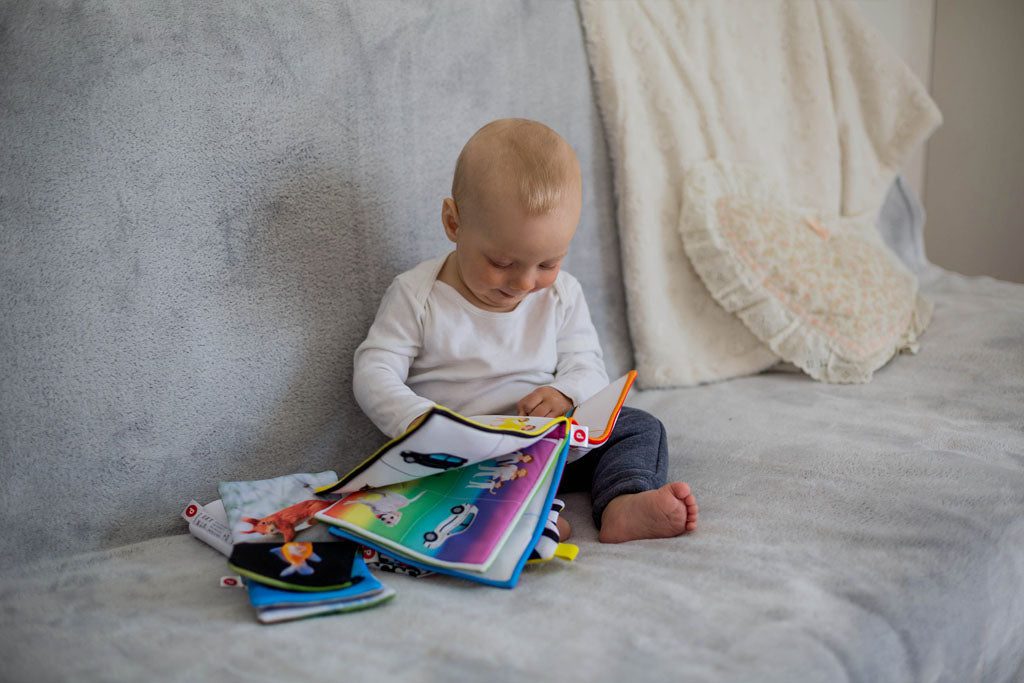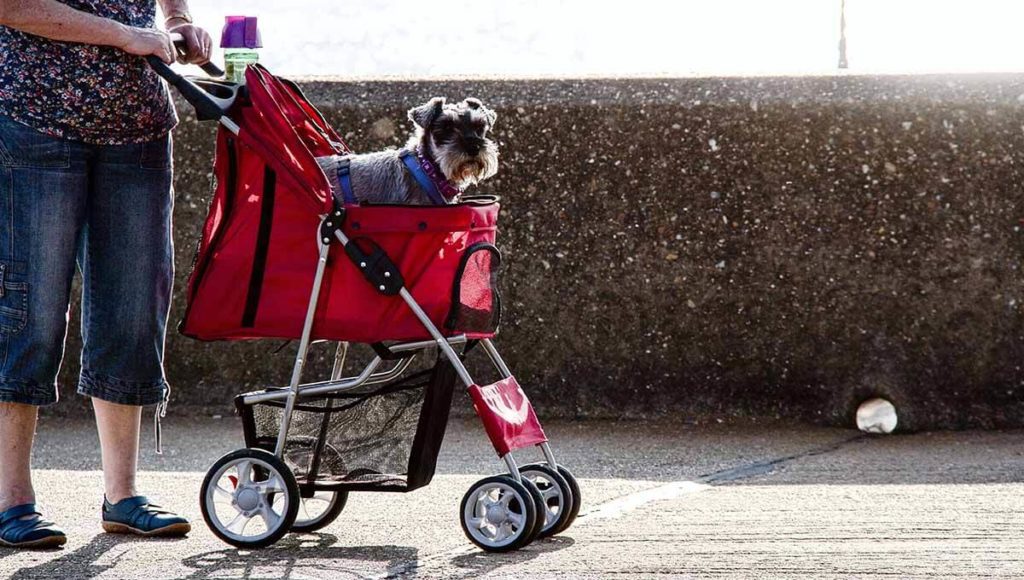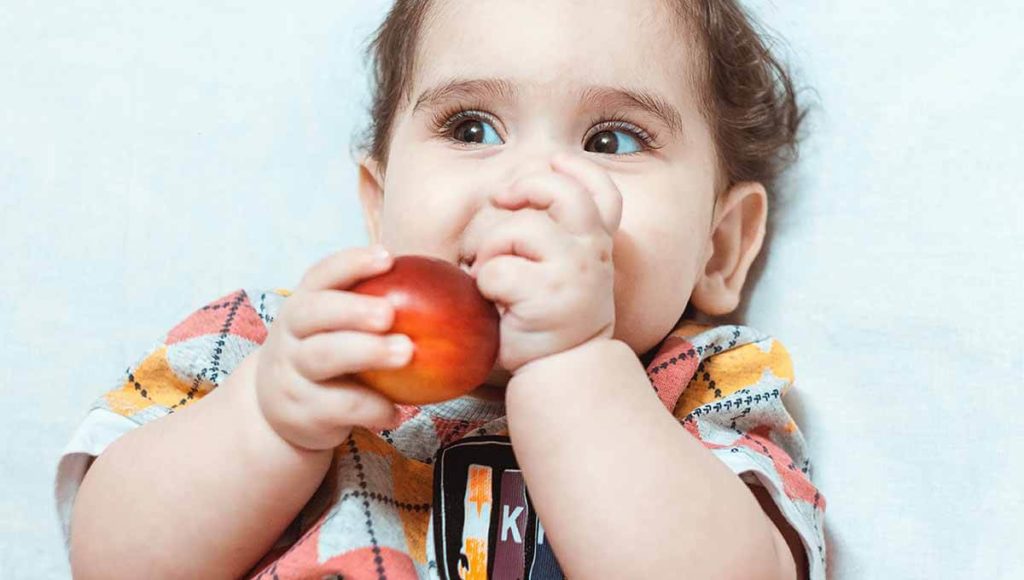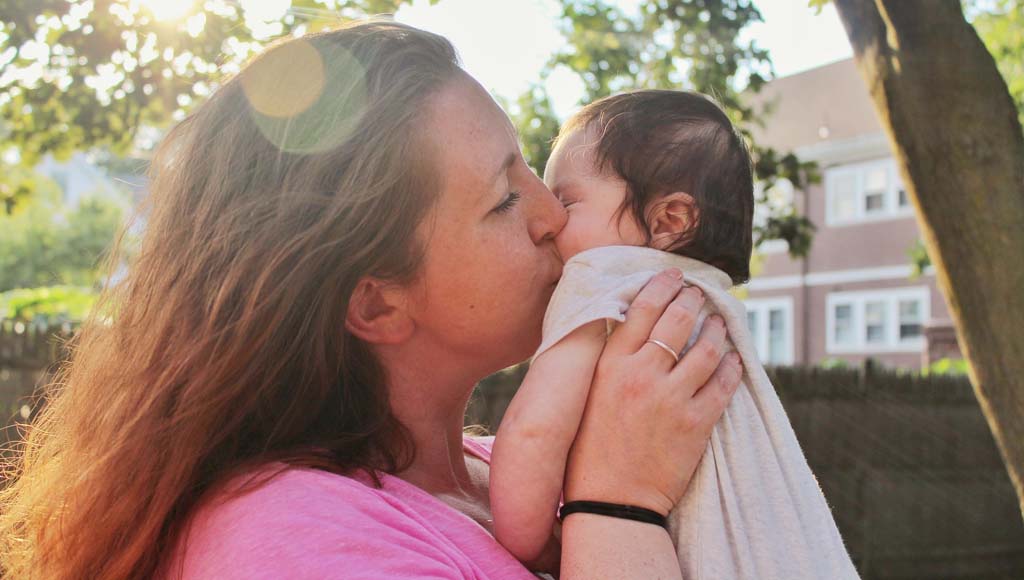Your baby has completed the first half-time of their year and now, prepare yourself for a month full of baby breakthroughs, repetitive actions, and probably the first time your young one will say “mama” or “dada”.
Once your baby has reached the 7th-month mark, expect your days to get busier and more active since babies this age will start to improve their motor abilities to develop skills such as grasping, rolling over, sitting up, and possibly even crawling.
In this comprehensive guide, we will be taking a look at your 7-month old baby’s growth and development, milestones to achieve, their needs, and what to expect.
Your 7-month-old baby’s growth
Get your biceps ready because once a baby reaches the seventh-month mark, they will show increased gain in weight.
On average, a baby boy weighs about 18 pounds and 5 ounces, with a range in weights from 14 pounds all the way up to 22 pounds. On the other hand, a baby girl weighs about 16 pounds and 14 ounces, with a range from 13 pounds to 21 pounds, 4 ounces. Meanwhile, for those wondering if your baby can become the next basketball superstar, length averages for boys and girls, around 27 and 26 inches, respectively.
How can babies keep up with this exponential growth?
With a consistent diet consisting of breast milk of about four to six times a day or formula of about three to four bottles a day, and the inclusion of babies to digest solid foods, it is highly likely that the increase in weight can be attributed to such high appetite.
Your 7-month-old baby’s food and nutrition
Since your baby is still now in full capability to digest mashed, solid foods, weaning is well underway. Solid food will also develop babies’ biting and chewing skills by feeding themselves with finger foods such as fruits and veggie sticks, strips of meat, and biscuits. Your baby will try biting and chewing his/food which mean you can start giving mashed or minced foods.
During your baby’s 7th-month, aim to gradually increase the amount and diversity of food you give them and make sure to schedule it to reach three meals a day over the next few weeks. This will condition your young one’s tummy to be prepared to eat during these periods of the day.
Many parents wonder if babies can now drink ordinary tap water. Well, once they’ve reached this age, their stomach can safely handle tap water to drink, even without boiling it anymore. Your baby can also manage to drink water using sippy cups instead of a bottle.
Although your baby can already eat solid foods, a 7-month-old baby still needs to feed on milk, whether breast milk or formula – usually in the early morning, after lunch, and at bedtime. If your baby is unable to eat three meals of solid food a day yet, then they will want more than three milk feeds a day.
Your 7-month-old baby’s milestones
At this rate, your baby is becoming more independent and noticeably, creating their own unique personality. They are able to distinguish and favor certain toys they love, scoot or crawl from one place to another, and control their environment with caution.
Parents will be fortunate to create a lot of fun memories and it is essential to encourage the baby’s mobility, creativity, curiosity. Here are some of the major milestones of what your 7-month-old baby can do.
Your 7-month-old baby’s health
Food allergies occur to babies when their immune system sees food as a threat to their bodies. Usually, symptoms like rashes, vomiting, sneezing, and breathing problems appear after being exposed to the food within 30 minutes to 2 hours.
Decoding your child’s cough
A “wet” cough — cough that produces mucus or phlegm — is possibly caused by a cold, particularly if she has indications such as runny nose, sore throat, headaches, sneezing, and a mild fever. On the other hand, a “dry” cough — coughing without mucus or phlegm — can be caused by things, for example, tobacco smoke.
Dehydration in babies
With the small bodies of babies, they can’t store much fluid in their bodies. That’s why babies are prone to dehydration and can happen quickly, especially when in a hot environment or loses fluids from vomiting or diarrhea.
Can my little one drink water yet?
You can start giving your baby water with a sippy cup if she already started solids. Doctors recommend you to give a small amount of water to your baby to prevent dehydration, especially during hot weather, but check your pediatrician’s advice beforehand.
Baby hives
Hives, also known as urticaria, are itchy, raised welts that are found on the skin. Often they have pale centers and clusters in an area. Some of the most common culprits are dust, pollen, food allergens, and insect bites.
1. Motor Skills
Get more attentive than ever because your li’l one will be learning to get around from one place to another more frequently than in the past months. They will begin to creep, scoot, roll, crawl, or even combine all these movements to satisfy their curiosity to explore their surroundings.
It is essential to encourage your baby’s mobility by placing some toys out of their reach. Since babies can now sit unassisted, expect that playtime will become more independent. Provide more stimulation with the help of toys with sounds and textures that they can pass from one hand to another, shake, and develop their hand-grasping skills. Heads up! At this age, babies will put everything on their hands into their mouth so stay away from toys that can be a choking hazard.
In the seventh month of a babies they will use raking grasp instead of a pincer grasp. With their improved ability to grasp objects, expect that they will be able to learn to hold and drink utensils such as baby spoons and sippy cups, so they will have a more independent mealtime. Babies this age will also start to eat small food with their fingers, so giving them sliced fruits can be done.
2. Teething
During your baby’s fifth to the seventh month, they will undergo teething where your baby’s teeth start to come through their gum line. The signs that your baby is teething are drooling more frequently than usual and of course, it may bring some pain so they will get fussier too.
To help your baby with this gum discomfort, give him a cold washcloth or an FDA-approved teething toy to chew on. As much as possible, stay away from using topical pain relievers rubbed on the gums that contain benzocaine because of the potential for dangerous side effects.
Once the first few teeth are showing up on the gum line, brush them daily with a soft baby toothbrush and water and a grain-size, mild-flavored toothpaste. Typically, the two bottom middle teeth pop up first, followed by the two top middle teeth. The bottom and top two side teeth should stick out the gums over the next 3 or 4 months.
Don’t be alarmed if your baby doesn’t have any teeth yet at this age. Teething patterns vary widely. A few babies are born already with teeth, while others don’t start showing the signs of teething until they are over the age of 1.
3. Communication
Your baby is starting to explore and understand the meaning of language and communication. They will learn how to respond, at least a head turn, when you say “no” and when you call their name.
Your baby will become an expert at nonverbal communication, such as a variety of expressions with their face. They will be able to grasp your emotion by the tone of your voice and your facial reactions.
Get your phone camera ready because babies at this age will become more vocal by making a lot of different sounds such as laughter, blowing bubbles or raspberries, and babbling in chains of consonants such as “ma-ma-ma” and “da-da-da”.
4. Memory
Your baby’s memory has developed significantly and you will also notice that they will grasp the concept of permanence. For the past month, when you hide an object or your face while playing a game of peek-a-boo, your baby will think that these hidden items will be gone forever. At this age, they will start to realize that people and objects still exist, even after hiding them.
However, seven-month-old babies can also start to have separation anxiety and extreme clinging to you whenever you try to leave them alone or with other unfamiliar people, such as their babysitter. Since your baby is more comfortable around familiar faces, stranger anxiety may also start to become an issue. To avoid unwanted anxiety and crying, try out these tips.
- Schedule your departures when your baby has already eaten, has taken a nap, and is less cranky.
- If you have a new babysitter, have them come early. This will give ample time for your baby to get warm up with the babysitter before you leave them at home.
- Keep goodbyes short and sweet. Ask your babysitter to distract your baby with toys until you are out of sight.
- And finally, never feel guilty! Your baby is likely to stop crying and being grumpy a few minutes after you leave.
Your 7-month-old baby’s Sleeping Routine
Your baby will still need to maintain sleep of about 12 to 16 hours in 24 hours, including two to three naps during the daytime. It is essential to let your young ones nap as long as they want, just make sure that they are awake long enough during the day so that they are tired enough at bedtime during the night. The more they have used up their energy during the day, the more easily they will fall asleep at night.
To help your baby fall asleep more easily, create a short, relaxing bedtime routine, such as giving them a warm bath, singing sweet and soothing lullabies, or a quick milk feeding. Place your baby in their crib on his back while still awake and eventually, they will fall asleep on their own. If your baby cries while you are leaving the room, return to him and give a few soothing hums and words and then gently leave again. With a continuous sleeping routine like this, your baby is less likely to sleep each night.
Tips in Taking Care of your 7-month-old Baby
When it comes to your baby’s health and needs, all parents want the best. After all, keeping the li’l ones healthy and safe is one of the most important responsibilities parents must do. Although it can be a daunting task, there are basic ways to keep in mind to have a healthy baby. Here are some baby care tips to do.
Car Safety
When it comes to traveling, many parents already know that bringing along a baby can be tiring and vexing. From the loud traffic noises to the dizzying car swerves, indeed a baby would get grumpy and irritable. Fret not because there are still ways to manage your road trip with your baby by following these tips.
Getting a high-quality baby car seat is essential since there will always be a time that you need to travel with your baby, such as going to his pediatrician and going to the park. It is best to get a baby car seat that is appropriate to your baby’s age, size, and weight. This will not be difficult since all manufacturers include this information.
Babies and toddlers need to ride in an approved, properly installed rear-facing car seat until they reach the highest weight or height allowed by the seat’s manufacturer. It should be installed at your car’s back seat, ideally in the middle, and your baby should be securely fastened, even on quick car trips.
Taking Your Baby’s Body Temperature
The changes in our body temperature is one of the most prominent ways to determine if we are sick, including babies and toddlers. A normal temperature in babies is about 97.5°F, but this can vary slightly. A high temperature or fever is usually considered to be a temperature of 100.4°F or above.
Here’s how to take your baby’s temperature.
- The best device to use is a digital thermometer to get a fast, accurate reading. They are widely available in most supermarkets and pharmacies.
- Hold your baby comfortably on your knees and put the thermometer in their armpit. It is advisable to use the thermometer in the armpit with children under 5 years.
- Gently, but firmly, hold their arm against their body to keep the thermometer in place for however long it says in the manufacturer’s instructions. Most digital thermometers beep when they’re ready.
- Read the display on the thermometer to know your baby’s temperature.
If your baby’s temperature is high, contact your doctor immediately to see what’s wrong.
Should a 7-month-old Baby Take Antibiotics?
Antibiotics are powerful medications used to treat bacterial infections, but they are ineffective against common viral infections that cause common colds and flu. Knowing if your baby should take an antibiotic should always be taken into consideration together with your baby’s doctor. If antibiotics are prescribed, it’s essential that your baby takes the whole course as advised by your doctor, even if he seems better before the course is finished.
Should a 7-month-old Baby Watch TV?
Now that your baby is always on the move, it may be tempting to just leave the TV on while playing child-friendly TV programs so you can have some time to yourself while your baby is “watching” but is it advisable to introduce screens to your child at this age?
The American Academy Of Pediatrics (AAP) discourages children under the age of 2 to have any screen time, except for a few minutes using a phone or computer to video chat. With the current pandemic situation, traveling to meet up with family members that are far away from home could not be possible and the only way to have social interaction with your baby is through video chats.
Instead, let your 7-month-old read interactive baby books such as pop-up books, “touch-and-see” books, and books with sounds. This will stimulate their visual, auditory, and spatial perception better.
Now that your baby is always on the move, it may be tempting to just leave the TV on while playing child-friendly TV programs so you can have some time to yourself while your baby is “watching” but is it advisable to introduce screens to your child at this age?
The American Academy Of Pediatrics (AAP) discourages children under the age of 2 to have any screen time, except for a few minutes using a phone or computer to video chat. With the current pandemic situation, traveling to meet up with family members that are far away from home could not be possible and the only way to have social interaction with your baby is through video chats.
Instead, let your 7-month-old read interactive baby books such as pop-up books, “touch-and-see” books, and books with sounds. This will stimulate their visual, auditory, and spatial perception better.
Conclusion
Your 7-month-old baby is becoming more independent when exploring their surroundings and the people around them. This is a very exciting month for parents out there, and of course, can also be challenging since they will start to do what they want on their own.
If you have any concerns with your child’s growth and development, reach out to your pediatrician so they can help you with the proper resources for support and if necessary, provide any needed medical advice.
With this comprehensive guide, you will be able to know what to expect with your little one, which will offer more relaxed and more predictable parenting. As you watch your baby grow more into an individual every month, celebrate all the ways their unique personality is taking shape.




